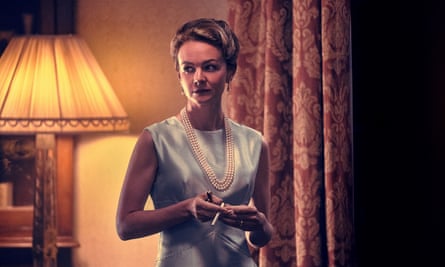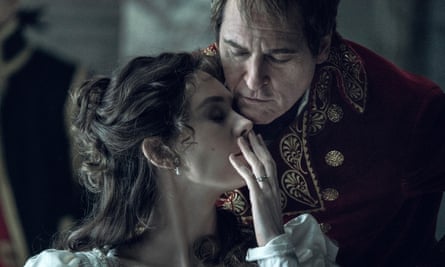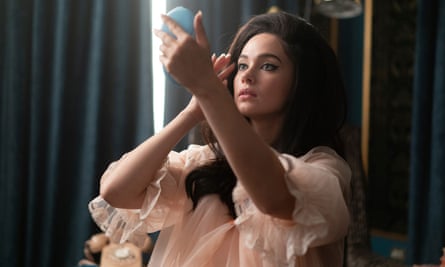T
It is said that a great man is often supported by a great woman. However, this year has seen a rise in biopics where the wives of these great men have stepped out of their shadows and demanded equal recognition. Being tied to a male “genius” is challenging, and the female characters in Oppenheimer, Napoleon, Maestro, Ferrari, and Priscilla make sure to let their partners know it. When Leonard Bernstein (Bradley Cooper) starts to slip up and hide his homosexual affairs from his family, Felicia Montealegre Bernstein (Carey Mulligan) does not hold back, exclaiming: “Your truth is a lie. It drains all the energy from every room.”
Maestro poses the question of whether infidelity is essential for creativity, or if it is simply used as an excuse for selfish behavior by artists who neglect their spouses. Felicia, who was also an actor, paused her own career to have children with her husband. Through Mulligan’s portrayal, she becomes a captivating example of how she must carry the emotional burden for their marriage to survive. Ironically, this is the second film in which Cooper, as director, co-writer, and star, has been overshadowed by his female co-star, following A Star Is Born.

In Christopher Nolan’s movie “Oppenheimer”, the main character (played by Cillian Murphy) is not portrayed as faithful. Nolan has stated that Kitty Oppenheimer (played by Emily Blunt) is one of the most intriguing characters in the film, but it takes 20 minutes for a woman to even speak and for the rest of the two hours, Blunt’s character is seen mostly as a housewife who drowns her sorrows in alcohol while being overwhelmed by crying babies. This is not much different from Mrs. Garrison’s line in Oliver Stone’s “JFK” of “Forget the truth, what about me and the kids, Jim?” However, towards the end of the film, Kitty becomes more assertive and reminds us that she is intelligent and determined.
In other instances, Oppenheimer presents Nolan attempting to make up for the lack of sexual content in his past movies by clumsily including scenes of the creator of the atomic bomb involved in intimate activities with his communist girlfriend Jean (Florence Pugh). And of course, a film directed by Nolan would not be complete without a deceased female character, a recurring theme in his work that makes one question if he prefers to portray women as memories rather than tangible beings. Oppenheimer does not fail to deliver in this regard.

The casting of Vanessa Kirby in Ridley Scott’s Napoleon adds depth to the character of Joséphine. Kirby portrays a sense of experience and sophistication, having gone through a previous marriage, children, and even time in prison. Her affair with Paul Barras, a prominent leader in the French Republic, adds to her complexity. In contrast, Tahar Rahim’s portrayal of Barras is much more alluring than Joaquin Phoenix’s depiction of Napoleon. While the battle scenes in Scott’s film are impressive, it is the intimate moments between Joséphine and Napoleon that are truly captivating. Despite his power, Joséphine is the one in control, reminiscent of Sharon Stone’s character in Basic Instinct. She boldly exposes her private parts to Napoleon, asserting her dominance over him. She even tells him that he is nothing without her, a statement that is hard to dispute. The film subtly suggests that it is only after their divorce (driven by Napoleon’s need for an heir) that things start to go wrong for him on the battlefield. While the film does not explicitly focus on their marriage, it is clear that Joséphine plays a significant role in Napoleon’s success and downfall. Unlike Scott’s previous films, The Last Duel and House of Gucci, Napoleon is not solely centered around a female character. However, it is still worth commendation for its attempt to portray a complex marriage dynamic.
Like Scott, Michael Mann has made admirable efforts throughout his career to develop his female characters into more than just one-dimensional figures. (See The Last of the Mohicans, Heat, Blackhat, and others.) While he may not always succeed, he at least makes an attempt, even in films that are not typically geared towards a female audience. In Ferrari, Penélope Cruz delivers a powerful performance as Laura Ferrari, the grieving and resentful wife of Enzo Ferrari. Despite her husband’s infidelity and their company’s impending downfall, she remains in control and fights to keep the business afloat. Meanwhile, Enzo (Adam Driver) seeks comfort from his mistress after the death of their son. Cruz’s performance is truly captivating, portraying a woman filled with pain and anger that almost makes you forget the focus is on her emotionally distant husband.
Avoid the newsletter advertisement.
after newsletter promotion

However, the titles of these movies do not include Mr and Mrs Oppenheimer, The Bernsteins, Napoleon and Joséphine, or Enzo v Laura, which showcases the filmmakers’ ultimate loyalties. This is not the case with Priscilla, the only film in this group that was both written and directed by a woman, Sofia Coppola. It is also the only one that portrays the central marriage entirely from the perspective of the wife, Mrs Elvis Presley (Cailee Spaeny). In an interview with Vogue, Coppola discussed her inspiration for the film, Priscilla Presley’s book Elvis and Me, and how it reflects upon the changes and lack thereof for women of her mother’s generation.
The one constant is that male directors are consistently given larger budgets and more extravagant projects. Coppola expresses frustration with this, as she sees her male colleagues receiving hundreds of millions of dollars while she and Priscilla had to make do with a mere $20 million for their films Oppenheimer, Maestro, Napoleon, and Ferrari, which on average cost upwards of $118 million.
Source: theguardian.com


